Activities of The Pack Forest Environment Fund
About The Pack Forest® Environment Fund
The Pack has commercialized a number of environmentally friendly materials over the years, developing bagasse paper in 1993, kenaf paper in 1995, Suiaru paper, specially treated to eliminate generation of dioxins and chlorine gases when burned, in 1999, and Ashi paper, which is made from reeds, in March 2002.
When these materials are used in packaging products, we contribute a percentage of revenue to The Pack Forest® Environment Fund, which engages in forest conservation and tree-planting activities. The fund is administered by the non-profit Eco Future Fund. Our employees and customers also engage in volunteer activities and help to recruit additional participants.
Conservation activities have been conducted in Nishiwaga, Iwate Prefecture since 2001; Yoshino, Nara Prefecture (a World Heritage site) since March 2002; Onna, Okinawa Prefecture since October 2003; Takehara, Hiroshima Prefecture since November 2004; Kimitsu, Chiba Prefecture since February 2009; Takatsuki, Osaka Prefecture since November 2009; Hidaka, Saitama Prefecture since March 2012; and Shijonawate, Osaka Prefecture since June 2016. A new program has also been established that enables customers to participate as well.
With a keen awareness of ESG, the fund will continue conducting forest preservation activities in line with local needs through collaboration with customers, the government, NPOs, community members, and The Pack. Thank you for your continued understanding and support.
About the Forest Mark
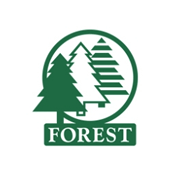
The Forest Mark is our original logo for The Pack Forest® Environment Fund and forest conservation and tree-plantingactivities. It can be printed on packages certi ed as Forest Products to help customers inform consumers of their contributions to forest conservation activities.
The Pack Forest® Environment Fund Process
We contribute part of our revenue from eco products to The Pack Forest® Environment Fund, and in collaboration with the NPO Eco Future Fund, forest conservation activities are conducted in nine locations around Japan.This activity also enables customers using eco-friendly products to contribute to forest conservation activities through their packages.
Results of Activities to Date (cumulative totals as of December 31, 2024)
- Participants: 7,558people
- Trees planted: 22,853
- CO2 absorbed: 2,113.67t
Materiality KPIs
In 2023, we identified as materiality KPIs undertaking 15 activities/year, with 500 participants, under The Pack Forest® Environment Fund and increasing the number of companies supporting The Pack Forest® Environment Fund to 300 companies. We remain committed to promoting and expanding these activities while planting trees on even more sites.
Trend in activity results(Figures for each fiscal year are as of December 31)
| 2020 | 2021 | 2022 | 2023 | 2024 | |
|---|---|---|---|---|---|
| Annual activities (times) | 0 | 0 | 4 | 9 | 8 |
| Annual participants (persons) | 0 | 0 | 111 | 253 | 230 |
| Supporting firms(companies)※ | 44 | 67 | 94 | 123 | 158 |
Tree-Planting Sites
1st Tree-Planting Site: Nishiwaga, Iwate Prefecture
The activities of The Pack Forest® Environment Fund began here in June 2001, at this first tree-planting site. Thereafter, a total of about 1,300 broadleaved trees, including beech, oak, jolcham oak, and zelkova were planted until October 2009. This site is located in a snowy region, where the typical snowfall exceeds two meters. Every fall, when the saplings were small, participants worked to secure each tree to a stake and securely drive the stakes into the ground to prevent trunks and branches from snapping under heavy snow. Most of the planting efforts at the site were completed by 2014. Maintenance activities, mainly undergrowth cutting, have been entrusted to the local forestry association since 2015.
1st Tree-Planting Site: Nishiwaga, Iwate Prefecture(tree-planting began in June 20011)
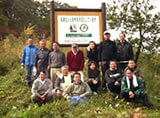 Signboard for the tree-planting site
Signboard for the tree-planting site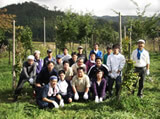 Group photo (taken in 2009)
Group photo (taken in 2009)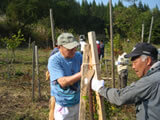 Setting a stake upright as a countermeasure against snowfall
Setting a stake upright as a countermeasure against snowfall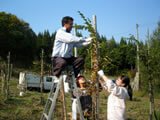 Climbing on a stepladder and securing a tree to a stake
Climbing on a stepladder and securing a tree to a stake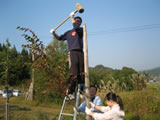 Driving the stake into the ground to make it stand firmly upright
Driving the stake into the ground to make it stand firmly upright2nd Tree-Planting Site: Yoshino, Nara Prefecture
Since the first planting in March 2002, various trees have been planted at this site, including horse chestnut, Mongolian oak, zelkova, beech, and yamazakura (Japanese mountain cherry)—in total numbering about 3,800. Yoshino serves as a gateway to Mt. Yoshino, a World Heritage site, and is renowned for its cherry blossoms. Our activities at this site include not just planting trees, but thinning trees, thereby contributing to efforts to maintain this World Heritage site. We support tree thinning efforts, or Genni Mori in Mt. Yoshino, in which volunteers from the general public and sponsor companies participate. In collaboration with the local forestry association, we’ve also held various thinning-tree experience events, such as one in which we made a bench using thinned wood with local volunteers. In addition, we support and participate once a year in customer forest preservation activities in Yoshino, Nara Prefecture. We plan to continue undertaking activities to create forests and for regional development.
2nd Tree-Planting Site: Yoshino, Nara Prefecture(tree-planting began in March 2002)
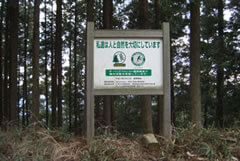 Signboard for the tree-planting site
Signboard for the tree-planting site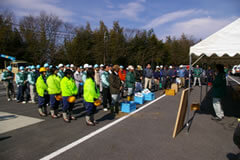 Opening ceremony
Opening ceremony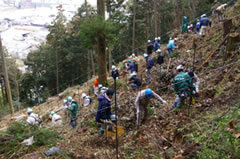 Thinning on sloping ground
Thinning on sloping ground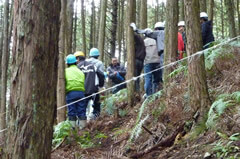 Maintenance work on the site after planting
Maintenance work on the site after planting3rd Tree-Planting Site: Onna, Okinawa Prefecture
We began our activities in October 2003, and we’ve undertaken various activities tailored to the problems affecting the site. From 2003 to 2008, a total of more than 700 trees were planted, including basho (Japanese banana), sharinbai (Rhaphiolepis umbellata), and Alexandrian laurel, which was aimed at reducing damage to corals and the fishery due to red clay flowing out from the fields. Before embarking on these activities, we provided participants with an opportunity to learn about the significance of them through a lecture on the red clay problem at a local university. In 2009, we planted 170 azalea bushes at the former site of a pine forest that suffered pine weevil damage and was subsequently burned. From 2014 to 2016, some 1,200 trees were planted in Manzamo, a famous tourist destination, with the goal of regenerating a windbreak forest damaged in a typhoon.
3rd Tree-Planting Site: Onna, Okinawa Prefecture(tree-planting began in October 2003)
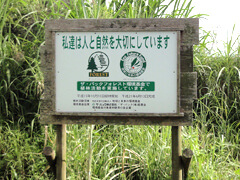 Signboard for the tree-planting site
Signboard for the tree-planting site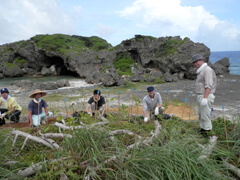 Planting
Planting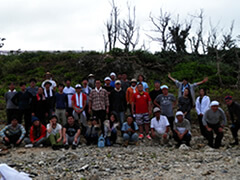 Group photo (taken in 2015)
Group photo (taken in 2015)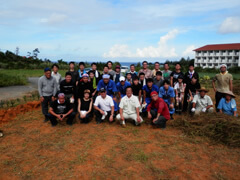 Group photo (taken in 2016)
Group photo (taken in 2016)4th Tree-Planting Site: Takehara, Hiroshima Prefecture
Since November 2004, we’ve pursued tree-planting activities in a location where wildfire destroyed a forest. Some 170 to 350 people from local high schools, businesses, and the general public participated in major tree-planting activities on 11 different occasions, planting some 12,600 trees in the time leading up to 2015. Later, saplings, mainly of Japanese maple, Japanese red pine, yamamomo (Japanese bayberry), and yamazakura, were planted to restore a mountain forest damaged by landslides caused by heavy rains in July 2018. With its foundations of granite soil, Hiroshima Prefecture is prone to landslides. We can reduce the impact of landslides by planting trees that take deep root. With cooperation from our employees, local businesses, and volunteers from the general public, we will restore the mountain forest while making it disaster-resistant.
4th Tree-Planting Site: Takehara, Hiroshima Prefecture(tree-planting began in November 2004)
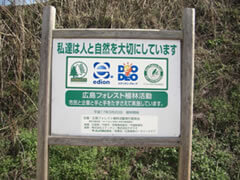 Signboard for the tree-planting site
Signboard for the tree-planting site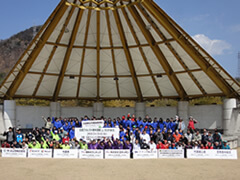 Group photo (taken in 2015)
Group photo (taken in 2015)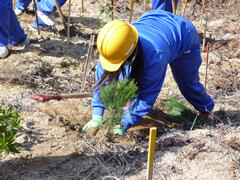 Planting
Planting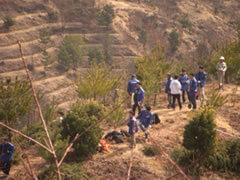 Planting
Planting5th Tree-Planting Site: Kimitsu, Chiba Prefecture
We began our planting activities in Kimitsu, on the Boso peninsula, Chiba Prefecture, in February 2009. The tree-planting site consists of surplus soil disposed of with the building of a forest road, owing to the soil’s poor quality. Nevertheless, we named the site Yutaka-no Mori (Forest Rich with Fruit) in the hopes of it someday providing abundant fruit harvests. The work that needed to be done at this site included installing sapling guards around the individual saplings to protect them from deer, which have grown to abundant numbers here. From 2009 to 2011, we planted Japanese apricot, orange, peach, plum, persimmon, and crab apple trees. Maintenance activities, mainly undergrowth cutting, were entrusted to a local forestry association. Not that the trees have matured, we are able to harvest Japanese apricots. The forest is continuing to grow into one that will one day provide abundant fruit harvests.
5th Tree-Planting Site: Kimitsu, Chiba Prefecture(tree-planting began in February 2009)
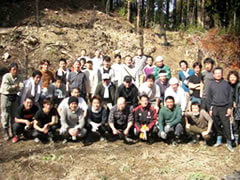 Group photo (February 2009)
Group photo (February 2009)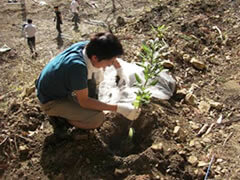 Planting
Planting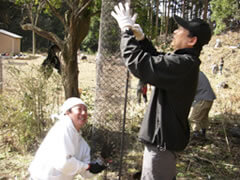 Covering a tree to protect it from feeding damage
Covering a tree to protect it from feeding damage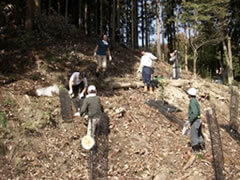 Planting on sloping ground
Planting on sloping ground6th Tree-Planting Site: Takatsuki, Osaka Prefecture
From 2009 to 2013, we undertook forest preservation activities at Harashiroyama in Takatsuki, Osaka Prefecture as part of the Osaka Prefecture Adopt-a-Forest Program. Under the Adopt-a-Forest Program, Osaka Prefecture functions as a mediator between a forest owner and a business to encourage businesses to create forests. After 2010, we pursued various other activities, mainly thinning bamboo forests, two to three times a year. During this time, we held various events, including a bamboo shoot picking event, and a Baumkuchen-making event sponsored jointly by four companies including our own. Participants enjoyed experiences in natural settings and meeting people from other companies.
6th Tree-Planting Site: Takatsuki, Osaka Prefecture(tree-planting began in November 2009)
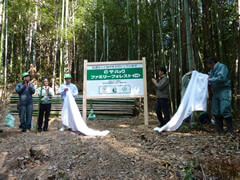 Establishment ceremony (November 2009)
Establishment ceremony (November 2009)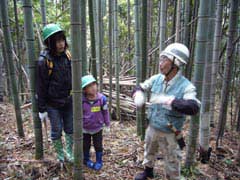 Thinning
Thinning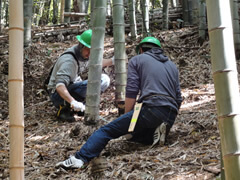 Thinning (April 2012)
Thinning (April 2012)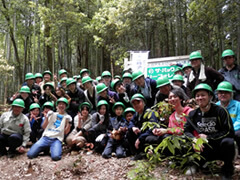 Group photo
Group photo7th Tree-Planting Site: Hidaka, Saitama Prefecture
The activities began in March 2012 in Hidaka, Saitama Prefecture, where our Tokyo Plant is based. With support from a local NPO, we planted a total of some 400 trees at this site, which is comprised of two separate areas. Since 2023, we’ve collaborated with one of our customers in these planting and related activities. As the site is prone to damage from wild animals, we’re expanding the planted area using a countermeasure against it, which is to cover individual saplings with a carefully selected sapling guard when planting them. Looking ahead, we plan to continue working to preserve and nurture the natural abundance here in cooperation with the customer.
7th Tree-Planting Site: Hidaka, Saitama Prefecture(tree-planting began in March 2012)
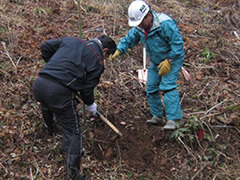 Planting a memorial tree
Planting a memorial tree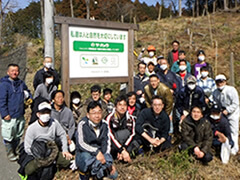 Group photo (March 2013)
Group photo (March 2013)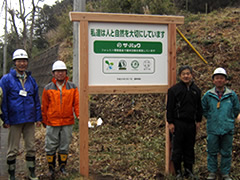 Signboard for the tree-planting site
Signboard for the tree-planting site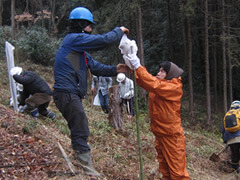 Planting
Planting8th Tree-Planting Site: Shijonawate, Osaka Prefecture
In June 2016, we began our activities at Fureai no Mori in Shijonawate, Osaka Prefecture as part of the Osaka Prefecture Adopt-a-Forest Program. We planned to undertake forest conservation activities three times a year (spring, summer, and fall), starting in the first year. Specific activities include thinning cedar and cypress trees, maintaining and repairing trails, and building and maintaining roads for work within the forest. One goal of the preservation activities is to regenerate the forest so that it can serve as a place of recreation for local citizens. We pursue these activities to achieve our goals alongside our employees and their families.
8th Tree-Planting Site: Shijonawate, Osaka Prefecture(tree-planting began in June 2016)
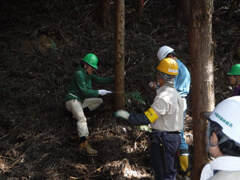 Thinning
Thinning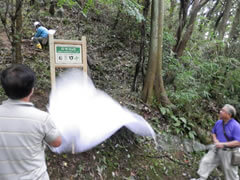 Unveiling ceremony
Unveiling ceremony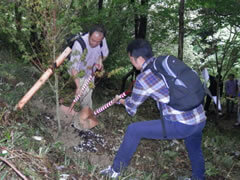 Planting a memorial tree
Planting a memorial tree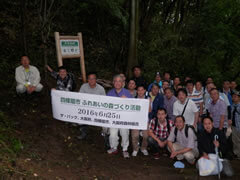 Group photo
Group photo9th Tree-Planting Site: Fujimi, Nagano Prefecture
In June 2023, we began our activities in Fujimi, Suwa-gun, Nagano Prefecture as part of Nagano Prefecture’s Forest Foster Parent Promotion Project, naming the 1.8-ha site The Pack Forest Fujiminomori after the activities. Forests occupy 80% of Nagano Prefecture, of which 30% is planted forests. This tree-planting site is a mountain forest stewarded by Tatsuzawa-ku, the region in which this site is located, and it is currently nearly time to fell the trees. Our activities will establish an industrial forest by replacing all of the Japanese larch and Japanese red pine trees, which are nearing their harvest dates, with new trees. The terrain at this site is flat and stable, and the actual planting is simple due to the use of saplings in planters. Family members, including preschoolers, have taken part in these activities. Looking ahead, we plan to continue working on creating sustainable forests.
9th Tree-Planting Site: Fujimi, Nagano Prefecture(tree-planting began in June 2023)
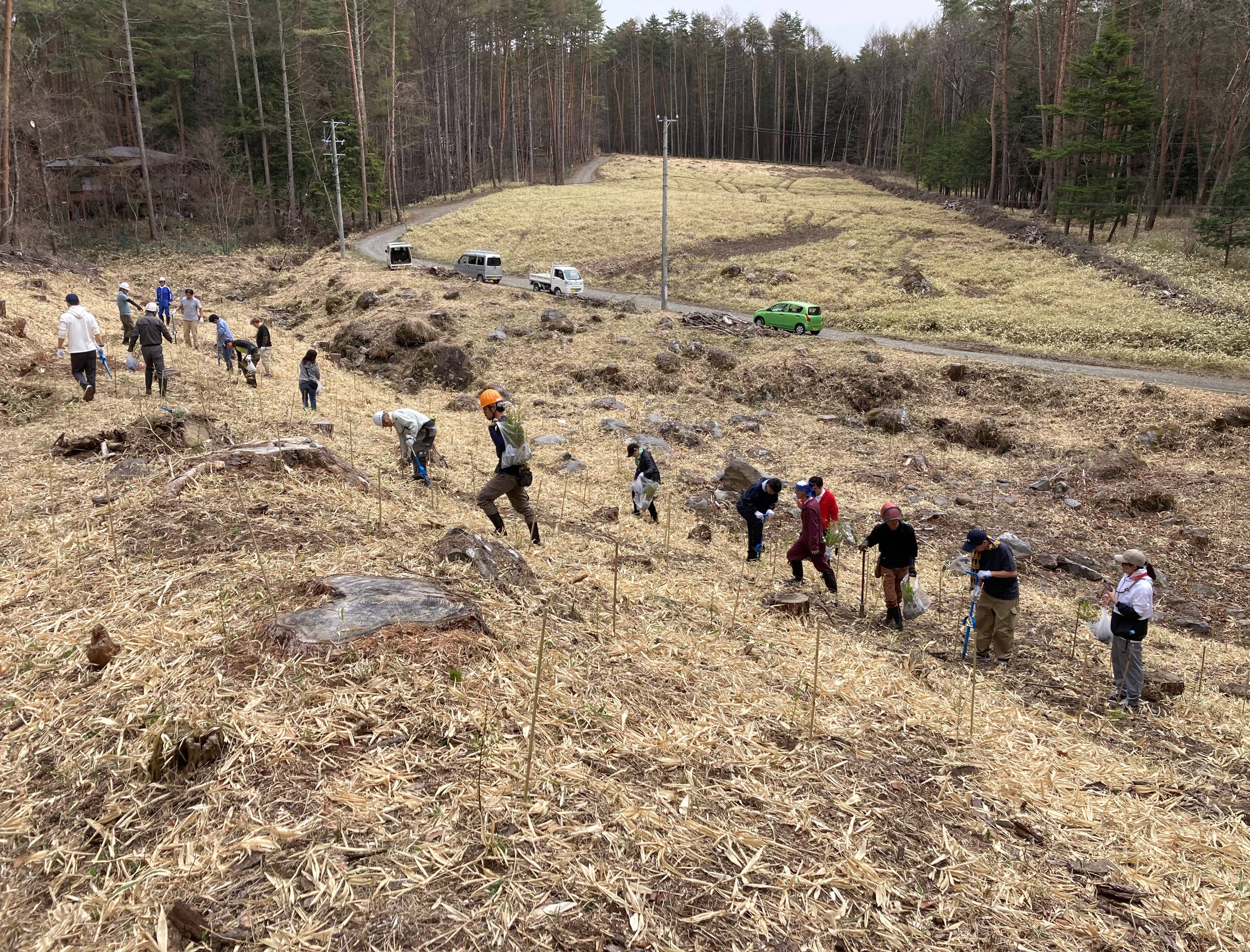 Planting
Planting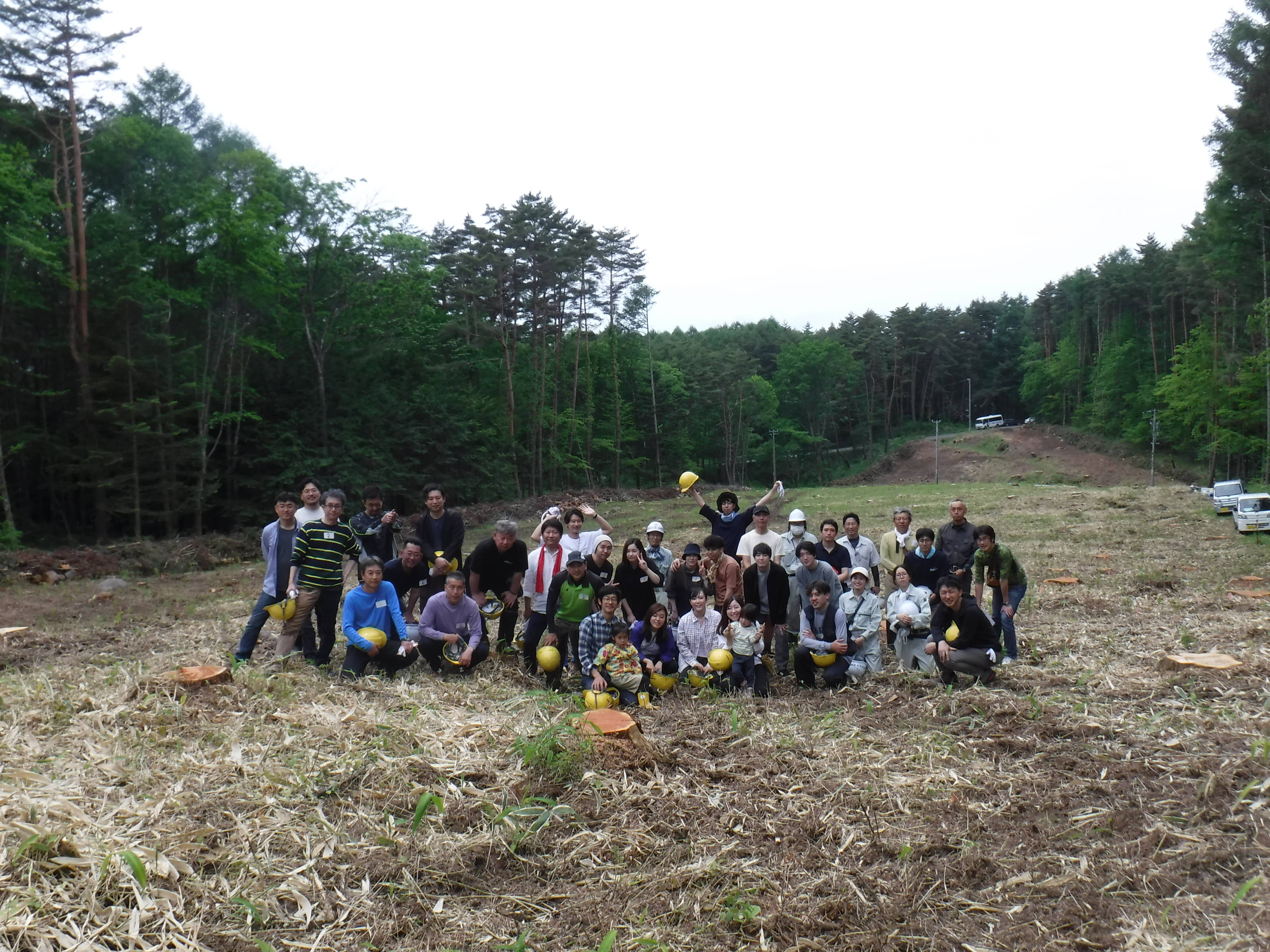 Group photo
Group photo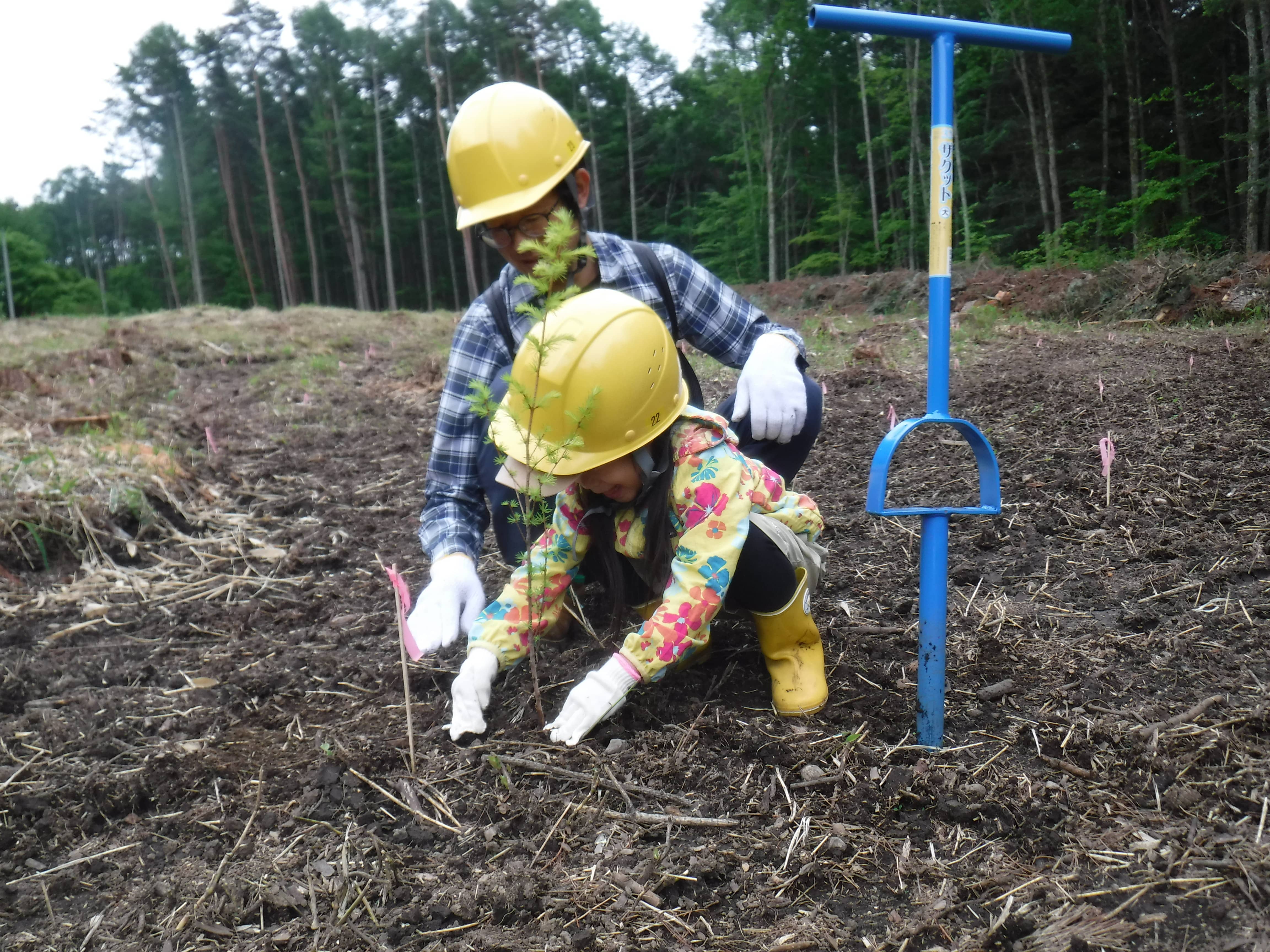 Planting
Planting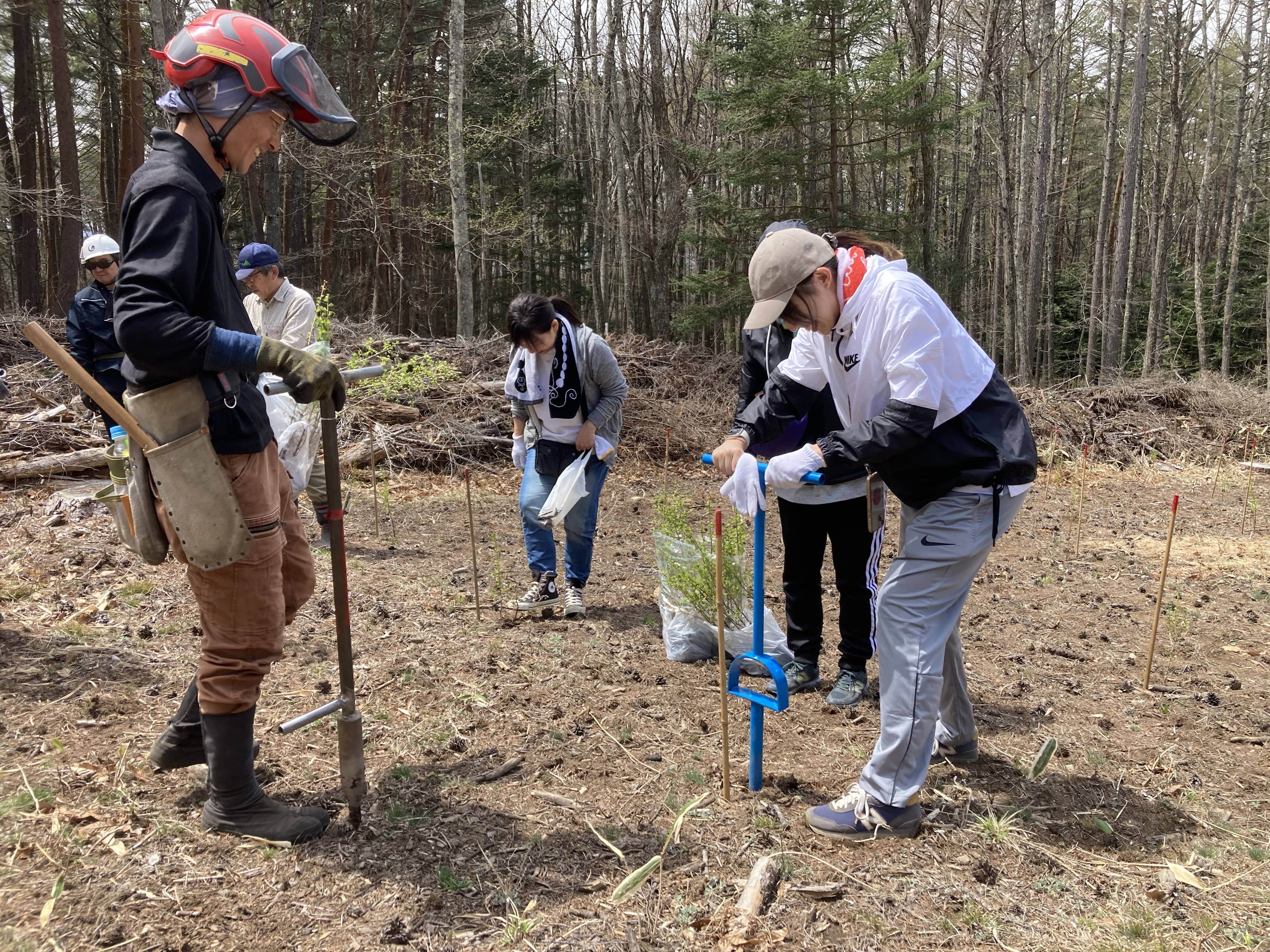 Planting
Planting